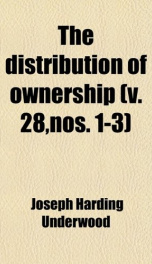the distribution of ownership

Purchase of this book includes free trial access to www.million-books.com where you can read more than a million books for free. This is an OCR edition with typos. Excerpt from book: CHAPTER III Ancient Ownership The primitive man, like the cercopithecus, probably appropriated only what he ate. Such possession was not ownership. It had no extension in time or in space. It had no other support than the physical strength of the possessor. There was no established relation among men. The Bushman has no house. He lays up nothing for the future. He possesses as an individual the food that he has in his hand, the woman that he keeps by his side. He owns nothing that he does not hold. There is no property until foresight begins. If any ownership may be assumed here it is private property; it is, indeed, individualism. Where the individual is a determinate clan, individualism passes into communism. Early liberty, which has no support but that of physical strength, is checked by a relative equality of condition, because when unaided and unvaried by external powers men are nearly equal. This equality soon becomes the unity of communism. If the savage clan has too little for its needs, and if it must fight with another clan, why should the individual fight with his clansman for more than enough? Or if the savage clan sprang up first where nature was profuse, why should the individual concern himself to take more than enough ? The whale cast up by the sea is shared by all the clan, so is the captive. Even after captives and women are used as domestic animals rather than as food and trophies, thereby making land more than a place to pitch tents, doubtless the 367] 23 chapter{Section 4clan at first owns them. The clan disposes itself on the land not with reference to ownership, but with regard to kinship. If it stays in one place, it obtains a consciousness of territorial claim, but subdivides it only for purposes of cultivation, and periodically reallots it to ...
Info about the book
Author:
Series:
Unknown
ISBN:
1176130366
Rating:
4.5/5 (2)Your rating:
0/5
Languge:
English
Users who have this book
Users who want this book
What readers are saying
What do you think? Write your own comment on this book!
write a commentGenre
if you like the distribution of ownership try:
Other books by this author
Do you want to read a book that interests you? It’s EASY!
Create an account and send a request for reading to other users on the Webpage of the book!

